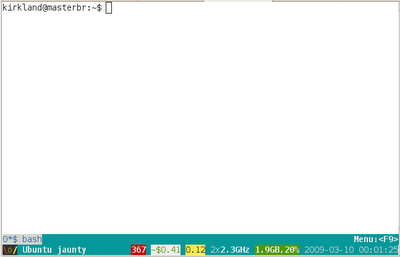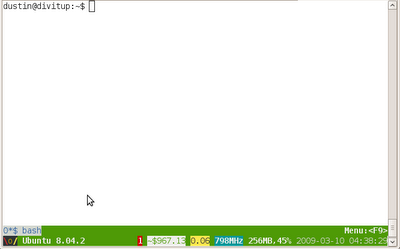I spent a week or so shopping for a replacement and settled, perhaps surprisingly, on a Dell Inspiron Mini9 netbook.

A strange choice for a server? you ask...
No way!
This little machine is:
- Cheap -- $230
- Small -- 2 lbs
- Quiet -- SSD hard drive
- Green -- 30W when running fully loaded
- Warrantied -- 1 year
- Built-in UPS -- a good 4 hour battery
- Built-in keyboard-video-mouse -- much easier maintenance, attended upgrades
- External ports -- 3 usb, 1 svga, sound, sd-reader, 10/100 ethernet, wireless
- Ubuntu! -- pre-loaded with 8.04 LTS
It's small enough and quiet enough to sit under my parents cable modem and router--they don't even notice it's there. Hurricanes and thunderstorms are common in Cajun country, so the built-in battery keeps the machine alive through short (<4 style="font-weight: bold;" size="4">A MythTV Frontend, Even?...
I also hooked up the external SVGA port to my 52" Samsung 1080p HDTV, and it spit out perfect 1920x1080 resolution. It was able to render full screen compressed HD content as well (haven't tried streaming HD yet). The only sound output is a stereo headphones jack (no 5.1 audio), and the wired ethernet is only 10/100mbps (no gigabit), so I won't be replacing my primary MythTV frontend yet. But there is some promise! At this price point, it's not much more expensive than a new Blu-Ray player. Heck, I think every $2500 TV should ship with one of these bolted onto the back ;-)
And then there's the Wife Factor...
I must say, it was strangely satisfying to open the new Dell packaging, catch the first whiff of brand new plastic, and see an Ubuntu 8.04LTS sealed cdrom attached to the manual. The first boot was also cool, answering the OEM questions, customizing the image for me. I didn't like the Dell desktop, so I immediately switched it back to the Ubuntu classic (I'll eventually reinstall the Ubuntu Server with no graphical desktop).
Now what happened next was even more surprising. My wife, Kim, says, "Oh my god, it's so cute! I love my new computer!"
Hah! Well, that was neither the reaction I was expecting, nor the intended purpose of this computer. But she's been using it quite a bit and she really likes it. She's gotten used to the keyboard, though it helps that her hands are smaller than mine and she doesn't use the | key or F-keys hundreds of times per day like I do ;-)
So it looks like I will be ordering another one now :-)
:-Dustin





